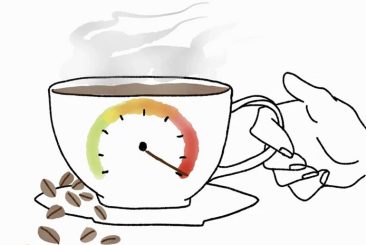Nutritionist emphasizes the importance of moderating caffeine intake, particularly during the latter half of the day, to ensure a good night’s sleep. While occasional coffee or tea cravings are common, excessive caffeine consumption, especially in the afternoon or evening, can disrupt sleep patterns. Caffeine is a stimulant that can interfere with the body’s ability to relax and fall asleep, leading to restlessness and reduced sleep quality. To promote sound sleep, it’s advisable to limit caffeine intake in the hours leading up to bedtime and opt for caffeine-free alternatives like herbal teas to ensure a restful night’s sleep.
1. Mindful mornings:

“Mindful mornings” involves beginning your day with a well-balanced breakfast comprising protein, fiber, and healthy fats. This approach helps stabilize blood sugar levels and reduces the immediate need for caffeine. Additionally, hydrating with a glass of water upon waking can rehydrate your body after a night’s rest, diminishing your dependence on caffeine for an energy boost. This morning routine sets a healthy tone for the day and promotes sustained energy without relying solely on stimulants like caffeine.
2. Strategic scheduling:

Strategic scheduling is essential when it comes to caffeine intake. Caffeine has a half-life of approximately 3-5 hours, meaning it can linger in your system for a significant duration. To safeguard your sleep quality, it’s wise to refrain from consuming caffeine too late in the day. This proactive measure ensures that caffeine doesn’t interfere with your ability to fall asleep or stay asleep during the night, promoting a restful and uninterrupted sleep pattern.
3. Herbal alternatives:

Exploring herbal alternatives is a wise choice for those looking to reduce their caffeine intake. Herbal teas such as chamomile, peppermint, or ginger make excellent caffeine-free options. These herbal infusions not only offer a diverse range of flavors but also come with potential health benefits, including relaxation and digestive support. Incorporating these soothing and caffeine-free beverages into your daily routine can be both enjoyable and beneficial for your overall well-being.
4. Portion control:

Portion control is essential, especially when dealing with beverages like energy drinks that may contain excessive caffeine levels. To manage your caffeine intake effectively, it’s crucial to be mindful of portion sizes. Consider opting for smaller cup sizes or even sharing a large coffee with a friend if you want to enjoy your caffeinated beverage without overdoing it. This approach not only helps you control your caffeine consumption but also ensures that you maintain a balanced and healthy relationship with caffeine in your daily routine.
5. Caffeine auditing:

Engaging in a caffeine audit by maintaining a caffeine journal can be an insightful practice for understanding how caffeine impacts your body. In your journal, record the time and quantity of caffeine consumed and closely monitor its effects on your energy levels, mood, and sleep patterns. This detailed log can serve as a valuable resource for identifying patterns and trends in your caffeine consumption and its consequences. Armed with this information, you can make informed adjustments to your caffeine intake to better align it with your health and well-being goals.
6. Listen to Your Body:

Listening to your body’s signals is paramount when managing caffeine consumption. Everyone’s tolerance to caffeine varies, so it’s crucial to pay close attention to how your body responds. If you notice symptoms like jitteriness, a rapid heart rate, digestive discomfort, or sleep disturbances, these may be signs that your caffeine intake is excessive or adversely affecting you. In such cases, it’s advisable to make adjustments to your caffeine consumption, either by reducing the quantity or spreading it out more evenly throughout the day. Prioritizing your body’s comfort and well-being is key to maintaining a healthy relationship with caffeine.
Remember that individual tolerance to caffeine varies, so what works for one person may not work for another. It’s essential to listen to your body and adjust your caffeine consumption accordingly. If you’re uncertain about your caffeine intake or experience adverse effects, consult with a healthcare professional for personalized guidance on caffeine management and its impact on your health.
Disclaimer:
The information contained in this article is for educational and informational purposes only and is not intended as a health advice. We would ask you to consult a qualified professional or medical expert to gain additional knowledge before you choose to consume any product or perform any exercise.








